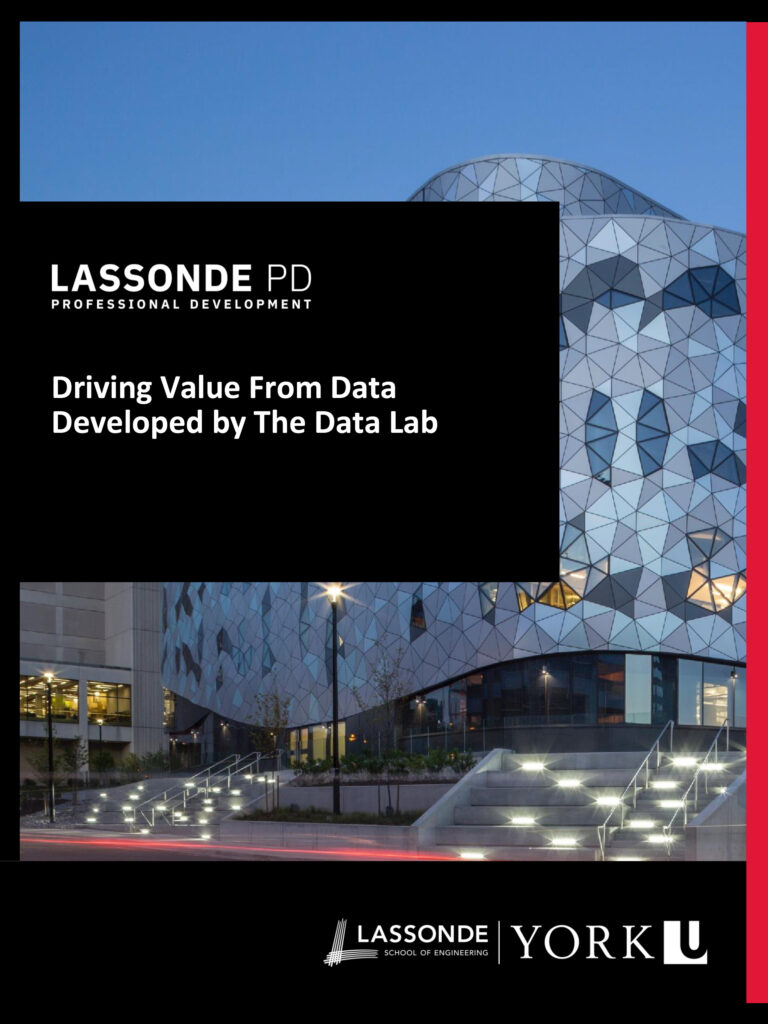Program Length
4 weeks
Program Dates
TBD
Program Format
self-paced, weekly coaching sessions
Tuition and Fees
$490 plus HST
Prerequisites
Management/ business experience
Course Overview
Developed by The Data Lab, Scotland’s innovation center for data and AI (Artificial Intelligence), Driving Value from Data is a self-paced online course that explores data and AI at an introductory level for senior business decision-makers.
Upon completion, participants will be able to:
● Describe how organizations use data and AI to drive value
● Identify and classify opportunities within their organizations
● Understand the challenges of data and how others have overcome them
● Justify the investment required to start adding value within their organization
Who Should Attend?
Enrich our growing community
- Leaders who are directly or indirectly accountable for driving value in their organizations.
- Small to medium sized business owners who want to drive more value from the information they already have.
- Data professionals who are struggling to get business buy-in to driving value from data.
What You Will Learn?
Course Learning Outcomes
- Describe how organizations use data to drive value
- Identify and classify data and related opportunities within their own organizations
- Explain how “data mature” their organization is and identify what needs to be done to build data maturity to align with organizational ambitions
- Summarize the main data-related challenges organizations face
- Assist in justifying the investment required within an organization to focus on driving value from data
Who Should Attend?
| Leaders who are directly or indirectly accountable for driving value in their organizations. Small to medium-sized business owners who want to drive more value from the information they already have. Data professionals who are struggling to get business buy-in to drive value from data. |
- Leaders who are directly or indirectly accountable for driving value in their organizations.
- Small to medium-sized business owners who want to drive more value from the information they already have.
- Data professionals who are struggling to get business buy-in to drive value from data.
What You Will Learn?
| Describe how organizations use data to drive value Identify and classify data and related opportunities within organizations Explain how “data mature” an organization is and identify what needs to be done to build data maturity to align with organizational ambitions Summarize the main data-related challenges organizations face Assist in justifying the investment required within an organization to focus on driving value from data |
- Describe how organizations use data to drive value
- Identify and classify data and related opportunities within organizations
- Explain how “data mature” an organization is and identify what needs to be done to build data maturity to align with organizational ambitions
- Summarize the main data-related challenges organizations face
- Assist in justifying the investment required within an organization to focus on driving value from data
WEEK 1 – DRIVING VALUE FROM DATA
• In week 1 the concept of data value is introduced and explored. Participants will look at data outcomes and their applications to their organizations’ data.
• Welcome and Introduction: course overview and introduction to the course leader.
• Data Value: an overview of the three primary areas where value can be created from data.
• Data Outcomes: using the strategy alignment canvas, learner attention is focused on identifying the right data that will support them in achieving desired organizational outcomes.
• Summary: key learnings from week 1 are brought together in preparation for week 2.
WEEK 2 – CASE STUDIES AND DATA ANALYTICS MATURITY
• In week 2, participants explore examples of the different uses of data in practice and how to apply them to the data maturity model.
• Welcome: a brief review of week 1 and an introduction of what will be covered in week 2.
• Case Studies – Applying the Maturity Model: review examples of data as they apply to the maturity model.
• Monetization and Completing the Maturity Model: data maturity is explored in greater depth as it applies to monetization.
• Summary: a review of week 2 learning in preparation for week 3.
WEEK 3 – FULL DATA MATURITY ASSESSMENT
• Welcome: In week 3, the course builds on data analytics assessments and introduces the data maturity matrix to understand what, beyond data, is needed for a business to succeed.
• Alignment to Ambition: data strategy’s role in influencing organizational ambition and success is explored here.
• Delivering your Ambition: how do use the different data analytics and strategies toward getting started on delivery?
• Embrace Data Insights: How do leaders create a work environment conducive to employees embracing data insights?
• Reflection on all Three Dimensions: Here, the maturity model is extended to three specific dimensions.
• End of Week 3: Summary and conclusion to Week 3 learning outcomes.
WEEK 4 – TIPS FOR SUCCESSFUL EXECUTION
• Welcome: The focus of our final week is on successful execution.
• The Value Challenge: Exploration of the first theme of value.
• Data as a Valued Asset: How to value data.
Faculty
Program Lead

Craig is a strategy advisor and coach with specialisms in Business, Data and Digital transformation. He is particularly interested in strategy, leadership, people development and ethics.
Craig works with The Data Lab as an Executive Education Advisor (to develop and deliver interactive workshops on the business opportunity presented by data and AI), with The Business School at The University of Strathclyde as a Global Practitioner (to develop and deliver content on Digital Transformation) and with several other organizations, helping them with the practicalities of delivering digital and data transformations.
Craig believes in investing in people to help them develop as individuals, to enjoy their work and to fulfil their potential. He has a pragmatic approach and an inclusive style that allows him to rapidly build trust.
